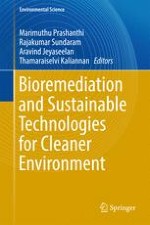2017 | OriginalPaper | Buchkapitel
Optimization of Biosurfactant Production and Crude Oil Emulsification by Bacillus Sp. Isolated from Hydrocarbon Contaminated Soil Sample
verfasst von : P. Kanmani, E. DivyaSri, R. Rajakarvizhi, O. S. Senthamil, V. Sivasankari, J. Aravind
Erschienen in: Bioremediation and Sustainable Technologies for Cleaner Environment
Aktivieren Sie unsere intelligente Suche, um passende Fachinhalte oder Patente zu finden.
Wählen Sie Textabschnitte aus um mit Künstlicher Intelligenz passenden Patente zu finden. powered by
Markieren Sie Textabschnitte, um KI-gestützt weitere passende Inhalte zu finden. powered by
